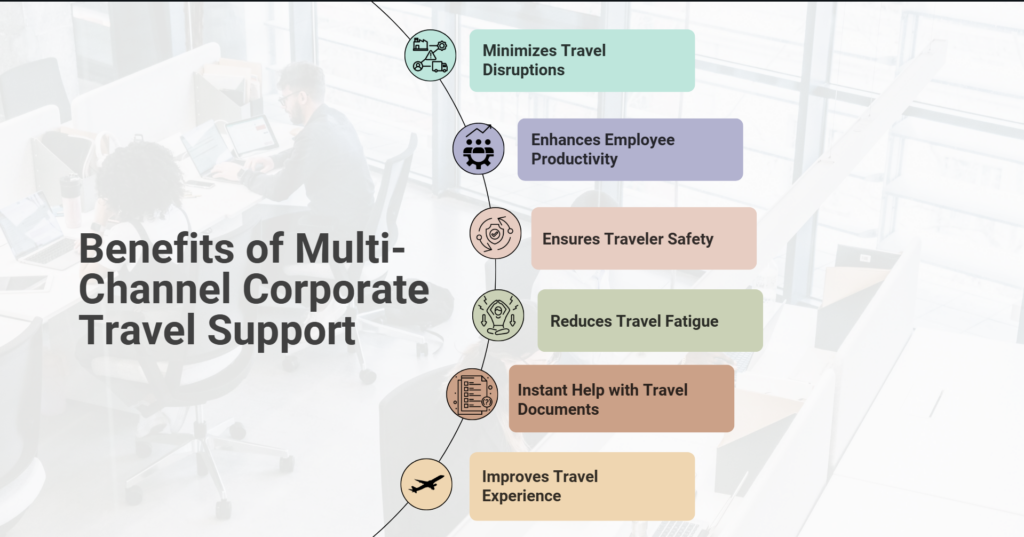
Imagine this: one of your senior executives has to board a flight for a client meeting. Midway through their trip, a flight cancellation throws their schedule into chaos. To add to the tension, their cab is stuck in traffic, and the boarding pass won’t load. The clock is ticking, and the stakes are high. As a travel manager, you might have encountered last-minute panic traveler calls, or your support system is not working.
In such scenarios, business travelers can become frustrated. This, in turn, can lead to missed meetings and further disrupt your business goals. But imagine having access to a seamless corporate travel support- a system where you can attend to travelers in such emergencies. Support that attends to the needs of travelers rebooks flights, and provides a substitute for transportation at the touch of a button.
Hence, business travel support is becoming increasingly crucial. Statistics show that Americans take over 405 million business trips annually. Which means that 1 million people travel daily. This highlights the need for timely and efficient travel support.
In this blog, we will help you understand the role of travel support in business travel and how multi-channel support can assist travelers.
A Journey into the History of Business Travel Support
Business travel has evolved a lot over the centuries. But what does this mean for the world we travel today? From oversized trunks to compact carry-ons, the business travel industry has seen a massive transformation. This has led to a shift in travelers’ habits and priorities. And humans have always been explorers at heart. They have traveled far and wide for trade, innovation, and ambition.
In the early days of business travel, journeys were cumbersome and relied on manual arrangements. Letters, telegraphs, and personal assistants were the tools of the trade. Due to this, travelers often faced delays or challenges with limited recourse.
Over the years, travel agencies came into existence and streamlined corporate travel. In the 20th century, working professionals began to rely on agents to book flights, hotels, and transport. However, these systems were reactive, leaving little room for flexibility during unforeseen disruptions.
The 1990s ushered in a new era of online booking platforms. It gave travelers control but lacked any sort of personal touch. Fast-forward to the 2010s, hybrid models were introduced. These systems came with 24/7 support, mobile apps, and data-driven insights. This set the stage for today’s AI-powered systems.
3 Key Components of Corporate Travel Support
Managing corporate travel is no small feat. As a travel manager, you must ensure smooth trips for your employees. This involves more than just booking flights and reserving hotel rooms. You need to provide robust support that allows your team to focus on their work while minimizing stress and maximizing efficiency.
Effective corporate travel support isn’t a one-size-fits-all solution. It’s a combination of key components working together to address every stage of the travel journey. From the initial booking to post-trip reconciliation, each element plays a vital role. This helps you in creating a seamless and productive experience for both travelers and the organization.
While providing business travel support to employees, multi-channel support is of utmost importance. This helps stranded travelers ask for help via various means.
The 3 main components of corporate travel support include:
1. Chat Support: Instant and Convenient Assistance
Chat support is a game-changer for modern-day business travelers. Available through mobile apps or online platforms, it provides a platform for instant communication with the corporate travel support teams. This allows travelers to resolve issues such as rebooking a flight, panning hotel visit details, or requesting clarifications on travel policies.
Chat support usually includes a chatbot where travelers can seek help in times of emergencies. The expert support team addresses problems instantly so that there is minimal interference with travelers’ plans.
2. Call Support: Personalized Problem-Solving
For complex issues or situations which require immediate attention, call support is invaluable. When travelers speak directly with a support staff, it allows travelers to explain their concerns in detail. They immediately receive personalized solutions and feel reassured during critical moments. Whether it’s navigating emergencies or arranging alternative travel plans, the human touch of call support can make all the difference.
3. Email Support: Comprehensive and Documented Responses
Email support is ideal for non-urgent queries. These can include policy clarifications, expense approvals, or post-trip reconciliations. It provides a documented trail of communication that can be useful in compliance and follow-ups. Also, email is a suitable way to ask more complex questions that require thoughtful, well-researched responses.
| According to the Global Business Travel Association (GBTA), 68% of North America-based respondents identified travel disruptions a significant barrier to business travel. |

AI in Multichannel Corporate Travel Support
“By far, the greatest danger of artificial intelligence is that people conclude too early that they understand it.” — Eliezer Yudkowsky
Imagine your top executive is rushing to catch a flight for a high-stakes client meeting. And a last-minute cancellation disrupts the entire plan. Or consider a sales team member stuck in a foreign country, unable to find a hotel due to an overbooking issue. In these moments, speed, accuracy, and real-time business travel support can make the difference. It can either create a successful trip or cause failure.
This is exactly where Artificial Intelligence (AI) is reshaping corporate travel support. AI transforms it from reactive assistance into a proactive, predictive, and personalized experience. AI doesn’t just automate responses, it anticipates problems and streamlines communication. It ensures every traveler gets the help they need, whenever they need it.
AI’s Role in Travel Assistance
For decades, the challenge of resolving trip-related problems faced by business travelers was either over the phone or via travel agents. Such means of solving these challenges were usually slow and frustrating prone to inefficiencies.
In corporate travel support, AI changes the game by integrating real-time multichannel support across chat, call, and email. This assures instant, data-driven solutions to issues, available for travel managers and employees.
Instead of waiting on hold with a travel agent, travelers now get:
- Instant chat resolutions through AI-powered bots.
- Proactive alerts about delays, cancellations, or disruptions.
- Personalized recommendations based on past bookings and travel policies.
- Faster human-assisted resolutions, as AI optimizes agent workflows.
AI as the ‘Always-On’ Travel Assistant
Unlike humans, AI in corporate travel support does not take breaks. It works round the clock through different communication channels so business travelers always have timely assistance.
Let us see how AI enhances each of the support channels:
1. Smart Chatbots
AI-driven chatbots are redefining travel support by instantly handling common travel requests. Chatbots can resolve issues in seconds, from rescheduling flights to retrieving itinerary details. This frees travel agents to focus on more complex cases.
How it works:
- A traveler texts the chatbot about a delayed flight.
- The AI bot instantly checks alternate routes.
- The traveler confirms a new itinerary—all within a minute.
Result:
- No waiting on hold.
- No need for multiple calls or emails.
- Faster issue resolution, minimizing travel disruptions.
| A recent survey by the Global Business Travel Association (GBTA) revealed two in five respondents say they are excited about the impact of AI on the business travel industry. |
2. AI in Call Support
AI isn’t replacing human travel agents, it’s making them smarter and faster. With features such as speech recognition, real-time call analytics, and AI-powered assistance, travelers get faster and more personalized solutions.
How it works:
- Predictive call routing: Connecting travelers to the most relevant agent.
- Real-time speech analysis: Detecting stress in a traveler’s voice and escalating urgent cases.
- Instant policy checks: Ensuring every booking aligns with company guidelines.
Result:
- Travelers receive accurate, policy-compliant solutions instantly.
- Agents are empowered with AI-suggested responses for faster resolution.
- Call times are reduced, improving traveler experience and operational efficiency.
3. AI in Email Support
Emails are still a patronized medium for corporate travel support, especially for intricate queries like requesting reimbursement, explanation of the policy, and changes to itineraries. AI is changing email assistance from a tortuous, manual method to a smart, automated experience.
The role of AI in email
- Auto-categorizes emails based on urgency.
- Instantly drafts responses for common queries.
- Flags high-priority requests for human intervention.
- Extracts key data (ex: receipts and invoices) for faster processing.
Result:
- Reduced response times.
- Greater accuracy in financial approvals and expense tracking.
- Travel managers spend less time handling manual requests.
The Way Forward for Corporate Travel Support
Advanced technologies are transforming every aspect of business travel. They are promising a future where business travel support is faster, smarter, and more predictive than before. As businesses put a premium on safety and experiences, innovations will change how travel managers and employees engage with support systems.
Here is what you can expect:
1. Hyper-Personalized Support with AI & Machine Learning
The future of corporate travel support will be hyper-personalized, thanks to AI-driven insights. Business travel support will no longer be reactive. Instead, AI will analyze travelers’ preferences, past bookings, and company policies to proactively suggest personalized options.
- AI will anticipate travel disruptions and suggest backup plans before an issue arises.
- Virtual assistants will auto-fill travel forms, suggest hotels within corporate policy, and even book trips with a single command.
- AI will recognize individual traveler preferences like preferred seat assignments, meal choices, and loyalty programs. This helps in ensuring a customized experience.
2. Voice-activated and Conversational AI Support
The rise of voice-activated AI assistants like Siri, Alexa, and Google Assistant will extend into corporate travel. Instead of logging into a booking tool or calling an agent, travelers will simply say:
“Rebook my canceled flight to Chicago on the earliest available option.”
- Voice-enabled booking or rebooking of airlines, hotels, or rental cars.
- Real-time travel policy inquiries like ‘Is this hotel within budget?’
- Immediate travel status by smartwatches, phones, or in-car systems.
3. Predictive Analytics to Prevent Travel Disruptions
Instead of waiting for a flight cancellation notification, predictive AI will forecast disruptions before they happen.
- AI will track weather, airline schedules, and historical data to give the exact prediction of flight delays even before they happen.
- The system will automatically reroute or initiate ticket rebooking if there are any delays.
- Travel managers will receive risk alerts on politically unstable regions, health risks, or geopolitical tensions before approving travel plans.
Multi-Channel Corporate Travel Support is Here to Stay
As a travel manager or a company owner, ensuring employee safety is of utmost importance. With an excellent corporate travel support system, you can ensure a seamless travel experience and enhance satisfaction for your employees. When travelers receive support on time, they feel respected and are stress-free which in turn helps you in reaching your business goals.
We, at itilite, understand the importance of timely support for business travelers. Hence, we ensure you get the best possible support in times of emergencies. Our business travel support includes professionals who assist via chat, call, and email. Not just that, stranded travelers also can contact us on weekends and outside working hours. The best part? Its free of cost!
Due to our professional expertise and timely assistance, users have rated us highly on the G2 platform.
To know more about us, book a free demo now!















 and then
and then